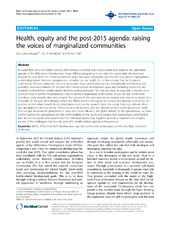| dc.description.abstract | In September 2012 the United Nations (UN) initiated a process that would extend and enhance the unfinished agenda of the Millennium Development Goals (MDGs), integrating a new vision for sustainable development beyond the year 2015. The initial consultation phase has been completed, with the UN and partner organizations undertaking eleven thematic consultations, including one on health. It is in this context that the European Commission (EC) has tasked the research consortium Goals and Governance for Global Health (Go4Health) with providing recommendations for the post-2015 health-related development goals and including voices that are routinely excluded from health-related decision-making processes. This has not been an easy task. It has led us to question how to define marginalization, how to access marginalized communities, as well as how community members could provide informed consent. The context of the communities we worked with was far removed from the reality of the post-2015 debates, where the MDGs and the new goals are remote and abstract, and where the promise of immediate benefit from participation could not be assured. Given the social, historical, cultural, ethnic and geographical diversity of our chosen community partners, and the diversity of their lived experiences, could their unique situations be generalized in ways that could influence the global debate? In this special issue, we have tried to explore the uniqueness and the commonalities of the issues and barriers that marginalized communities face all over the globe, and present them in individual papers that, together, provide a nuanced and complex picture of the challenges that face the post-2015 health-related agenda setting-process. | en_US |

